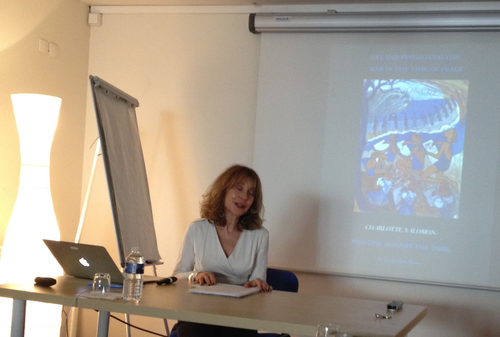Paris and Dr. Jacqueline Rose
November 3, 2014
By Lorena Morales Aparicio, Cohort '13
The second Topological Studies in Paris for Cohort ’13 included a master class with feminist, literature and psychology scholar Dr. Jacqueline Rose, who will be the Diane Middlebrook and Carl Djerassi Professor of Gender Studies at Cambridge this fall. In an astute and perfectly terse statement, an observation including a culture founded by Catholic kings and subsequently biased by the tyranny of the bourgeois, Rose asserted “Freedom requires the perfect amount of distance, or, total perspective.” In other words, freedom has been and is experienced as ideology—as the ideology of Western patriarchs. It is given to us and most do not interrogate it Socratically.
Rose, discussing the oeuvre of painter Charlotte Salomon, who produced her most robust and edifying work while interned during the Holocaust in the prolific series Leben? Oder Theater? 1941-1943, interpreted this kind of ideological freedom vis-à-vis authentic, true freedom. True freedom, as the work of Salomon proves, occurs as “dissonance [the] true respect of difference.” This is the dissolution of fixed boundaries that create distance, or ideologies, in order to experience the processes of others by renouncing a constructed state of false innocence, also the cursory acceptance of codified perspective; in Salomon’s case, the hateful rhetoric and will against Jewry, in which Europe indulged. Salomon’s creative virtue while in the concentration camp is the dissonance of love in the face of absolute ideological hate. Salomon affirmed her Jewish identity by acknowledging the love-hate binary and creating an against all odds affirmation of Levinas’ embrasure of being, beginning with herself.

In order to have freedom, or authentic being, you must inhabit the freedom of every person, everywhere. Salomon painted, a process inflected as much by irruptive unconsciousness as mediating consciousness, in a time of war, in a time of survival.
Rose asks of Salomon and of us, “What is the dissonance that allows us to survive?” Painting is an interpretation of the comprehensive environment that merges its various facets in a moment of instantiation. If Salomon could paint to survive and dissolve the instantiation of horror, Rose calls us to recognize ourselves in others, to dissolve hierarchy in melding with each other.
Dr. Rose’s publication, Women in the Dark, is now available. She is a regular contributor to The London Review of Books.
